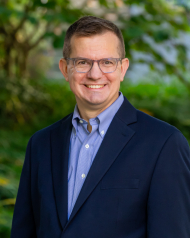Upcoming Events
School of CSE Seminar Series: Ben Raphael

Speaker: Ben Raphael, professor at Princeton University
Date and Time: April 18, 2:00-3:00 p.m.
Location: Coda, Room 230
Host: Xiuwei Zhang
Title: Mapping Tissue Organization and Development Across Space and Time
Abstract: The development of a multicellular organism from a single founder cell is the result of a complex process involving growth, death, and differentiation of cells. Recent technologies help quantify this process: spatial sequencing technologies measure spatial variation in cell types and gene expression across a tissue slice, while new genome editing technologies enable the tracking of cellular lineages during tissue development. In this talk, I will describe to reconstruct development processes using data from these technologies. First, I will present algorithms to align spatiotemporal transcriptomics data from multiple timepoints during the development of an organism. These algorithms use optimal transport to infer ancestral relationships between cell types and to estimate cellular growth rates. Next, I will present an algorithm to infer a cell differentiation map – a directed graph describing transitions between cell types – from single-cell lineage tracing data. This algorithm models unmeasured progenitor cell types and infers a cell differentiation map that balances the trade-off between the complexity of the map and the number of unobserved cell type transitions. These algorithms give insight into the gene expression programs that govern the growth and differentiation of cells over space and time.
Bio: Ben Raphael is the Graduate Class of 1991 Professor of Computer Science at Princeton University, and an affiliate faculty member at the Columbia University Irving Institute for Cancer Dynamics, the New York Genome Center, and the Rutgers Cancer Institute of New Jersey. His research in computational biology focuses on single-cell and spatial DNA/RNA sequencing, cancer evolution, lineage tracing, network/pathway analysis of genomic variation, and structural variation in human and cancer genomes. His group’s algorithms have been used in multiple large-scale cancer genomics projects including The Cancer Genome Atlas (TCGA), International Cancer Genome Consortium (ICGC), and Human Tumor Atlas Network (HTAN). He is Fellow of the Association for Computing Machinery (ACM) and the International Society for Computational Biology (ISCB). He is the recipient of the 2021 Innovator Award from the ISCB, the Alfred P. Sloan Research Fellowship, the NSF CAREER award, and a Career Award at the Scientific Interface from the Burroughs Wellcome Fund.
Event Details
Media Contact
Xiuwei Zhang (xiuwei.zhang@gatech.edu)
EVENTS BY SCHOOL & CENTER
School of Computational Science and Engineering
School of Interactive Computing
School of Cybersecurity and Privacy
Algorithms and Randomness Center (ARC)
Center for 21st Century Universities (C21U)
Center for Deliberate Innovation (CDI)
Center for Experimental Research in Computer Systems (CERCS)
Center for Research into Novel Computing Hierarchies (CRNCH)
Constellations Center for Equity in Computing
Institute for People and Technology (IPAT)
Institute for Robotics and Intelligent Machines (IRIM)